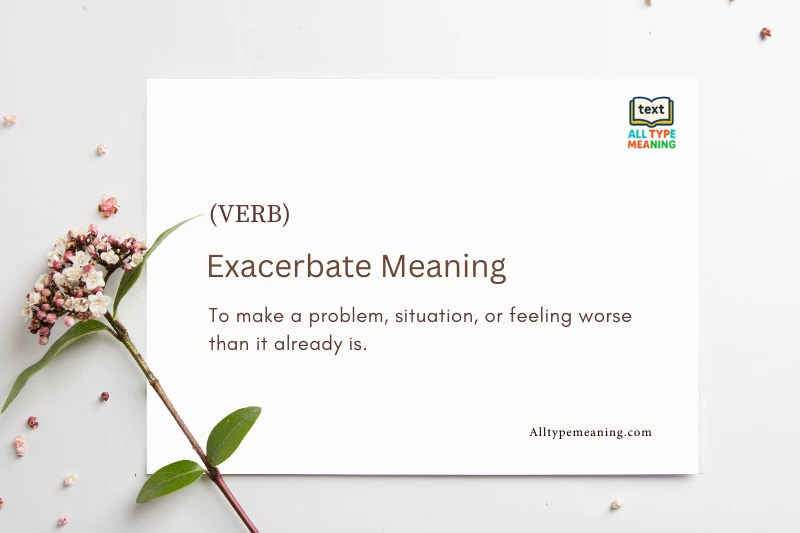Exacerbate meaning is often misunderstood, even though this powerful English word appears frequently in academic texts, news articles, and everyday conversations. Many learners struggle to grasp its true sense. Whether you’re a student preparing for exams, a professional improving your vocabulary, or simply curious about language, this comprehensive guide will help you master the exacerbate meaning with ease.
The word “exacerbate” is more than just another vocabulary term—it’s a versatile word that can transform how you express ideas about worsening situations, increasing problems, and intensifying difficulties. By the end of this article, you’ll not only understand the exacerbate meaning in multiple languages but also know exactly how to use it correctly in your writing and speaking. 💪
What Does Exacerbate Mean? The Complete Definition 📖
Exacerbate (pronounced: ig-ZAS-er-bayt) is a verb that means to make something bad even worse or to intensify a problem, situation, or feeling. When you exacerbate something, you’re essentially adding fuel to the fire 🔥—making an already difficult or unpleasant situation more severe.
Core Definition Breakdown:
- Primary meaning: To make worse; to increase the severity of something negative
- Secondary meaning: To aggravate or intensify an existing problem
- Part of speech: Verb (transitive)
- Etymology: From Latin “exacerbatus,” meaning “to embitter” or “to make harsh”
The exacerbate meaning revolves around the concept of worsening. Unlike words that simply describe bad situations, “exacerbate” specifically refers to the action of making those situations worse than they already were. 😰
Simple Examples to Remember:
- “The loud music exacerbated her headache.” (made the headache worse)
- “His rude comments only exacerbated the conflict.” (made the fight worse)
- “The rain exacerbated the flooding problem.” (made flooding worse)
Exacerbate Meaning in Different Languages 🌍
Understanding the exacerbate meaning across various languages helps students and learners from different backgrounds grasp the concept more effectively. Let’s explore how this word translates into several Indian languages:
Exacerbate Meaning in Hindi 🇮🇳
In Hindi, exacerbate translates to:
- बढ़ाना (Badhana) – to increase or worsen
- बिगाड़ना (Bigadna) – to spoil or make worse
- तीव्र करना (Teevra karna) – to intensify
Example: “उसकी गलत सलाह ने स्थिति को और भी बिगाड़ दिया।” (His wrong advice exacerbated the situation even more.)
Exacerbate Meaning in Tamil 🌴
In Tamil, the exacerbate meaning can be expressed as:
- மோசமாக்கு (Mosamaakku) – to make worse
- அதிகரிக்க (Athikarikka) – to increase or intensify
- கெடுக்க (Kedukka) – to spoil or damage
Example: “மழை வெள்ளப் பிரச்சினையை மோசமாக்கியது।” (The rain exacerbated the flood problem.)
Exacerbate Meaning in Telugu 📜
In Telugu, exacerbate means:
- దిగజార్చు (Digajaarchu) – to worsen
- తీవ్రతరం చేయు (Teevrataram cheyu) – to make severe
- చెడగొట్టు (Chedagottu) – to spoil or ruin
Example: “అతని మాటలు పరిస్థితిని దిగజార్చాయి।” (His words exacerbated the situation.)
Exacerbate Meaning in Bengali 📚
In Bengali, the exacerbate meaning translates to:
- খারাপ করা (Kharap kora) – to make bad/worse
- বাড়ানো (Barano) – to increase or worsen
- তীব্র করা (Teebro kora) – to intensify
Example: “তার ভুল সিদ্ধান্ত সমস্যাটি আরও খারাপ করেছে।” (His wrong decision exacerbated the problem.)
Common Synonyms and Related Words 💡
To fully grasp the exacerbate meaning, it’s helpful to understand related words and synonyms:
Strong Synonyms:
- Aggravate 😤 – to make worse or more serious
- Worsen 📉 – to become or make worse
- Intensify ⚡ – to increase in strength or degree
- Amplify 📢 – to make larger or more intense
- Compound ➕ – to make more severe by adding to
Milder Synonyms:
- Heighten 📈 – to increase or enhance
- Escalate ⬆️ – to increase rapidly
- Magnify 🔍 – to make appear larger or more significant
Antonyms (Opposite Meanings):
- Alleviate 😌 – to make easier to bear
- Improve ✅ – to make better
- Soothe 🕊️ – to calm or comfort
- Mitigate 🛡️ – to make less severe
Real-World Examples and Usage Scenarios 🌟
Understanding the exacerbate meaning becomes clearer when we see it in action across different contexts. Here are detailed examples from various fields:
Medical Context 🏥
“The patient’s smoking habit exacerbated his respiratory problems, making recovery much more difficult.”
In medical terminology, doctors frequently use “exacerbate” to describe how certain factors worsen existing health conditions. This usage emphasizes the serious nature of making health problems worse.
Environmental Issues 🌍
“Industrial pollution continues to exacerbate climate change, accelerating global warming at an alarming rate.”
Environmental scientists often use this word to describe how human activities make existing environmental problems worse, highlighting the urgency of the situation.
Social and Political Context 🏛️
“The politician’s inflammatory remarks only exacerbated tensions between the two communities, leading to widespread protests.”
In news and political discussions, “exacerbate” frequently appears to describe how actions or statements worsen social conflicts or political situations.
Educational Scenarios 🎓
“The student’s poor study habits exacerbated his academic struggles, resulting in failing grades across multiple subjects.”
Teachers and educators use this word to explain how certain behaviors make learning difficulties worse, helping students understand cause-and-effect relationships.
Business and Economic Context 💼
“The company’s decision to cut customer service staff exacerbated customer complaints, ultimately damaging their reputation.”
Business professionals use “exacerbate” to describe how poor decisions can worsen existing problems, making it valuable vocabulary for workplace communication.
How to Use Exacerbate Correctly in Sentences ✍️
Mastering the exacerbate meaning involves understanding proper usage patterns. Here’s a comprehensive guide:
Basic Sentence Structure:
Subject + exacerbate(s)/exacerbated + Object
Present Tense Examples:
- “Stress exacerbates many health conditions.” 😰
- “His attitude exacerbates workplace conflicts.” 💼
- “Poor weather conditions exacerbate travel delays.” ✈️
Past Tense Examples:
- “The medication exacerbated her symptoms.” 💊
- “Their argument exacerbated family tensions.” 👥
- “The economic crisis exacerbated unemployment rates.” 📊
Future Tense Examples:
- “This policy will exacerbate existing inequalities.” ⚖️
- “Ignoring the problem will only exacerbate it further.” ⚠️
Common Phrases and Collocations:
- “Exacerbate the situation” – make circumstances worse
- “Exacerbate tensions” – increase conflicts or stress
- “Exacerbate symptoms” – worsen medical conditions
- “Exacerbate problems” – make difficulties worse
Grammar Tips:
- Exacerbate is always a transitive verb (needs an object)
- It cannot be used without specifying what is being made worse
- Often followed by nouns like: problems, situations, conditions, symptoms, tensions
Common Mistakes to Avoid When Using Exacerbate ⚠️
Understanding the Exacerbate Meaning also involves knowing common errors:
Mistake #1: Confusing with “Exasperate”
Wrong: “The delay exacerbated the passengers.” 🚫 Correct: “The delay exasperated the passengers.” ✅ (Exasperate means to annoy someone; exacerbate means to worsen something)
Mistake #2: Using Without an Object
Wrong: “The situation just exacerbates.” 🚫 Correct: “The situation just exacerbates the problem.” ✅
Mistake #3: Incorrect Pronunciation
Many people mispronounce this word. Remember: ig-ZAS-er-bayt (not “ex-as-er-bate”)
Mistake #4: Using in Positive Contexts
Wrong: “The good news exacerbated their happiness.” 🚫 Correct: “The good news heightened their happiness.” ✅ (Exacerbate is only used for negative situations)
Conclusion: Master the Exacerbate Meaning Today! 🎯
Congratulations! 🎉 You’ve now mastered the complete exacerbate meaning and learned how to use this powerful word correctly in various contexts. From understanding its definition as “making something bad worse” to exploring its translations in Hindi, Tamil, Telugu, and Bengali, you’re now equipped with comprehensive knowledge about this important vocabulary word.
Remember these key points about the exacerbate meaning:
- It always refers to worsening negative situations 📉
- It’s pronounced ig-ZAS-er-bayt 🔊
- It requires an object (you exacerbate something) ✍️
- It’s used in formal writing, academic texts, and professional communication 📚
- It cannot be used for positive situations ⚠️
Whether you’re a student preparing for competitive exams, a professional enhancing your vocabulary, or someone passionate about learning new words, mastering “exacerbate” will significantly improve your communication skills. This word frequently appears in IELTS, TOEFL, SAT, and other standardized tests, making it valuable for academic success! 🏆
Practice using “exacerbate” in your daily conversations and writing. Start with simple examples and gradually incorporate it into more complex sentences. And if you’re exploring more advanced vocabulary, don’t miss our guide on Delimitation Meaning to further expand your word power.
Frequently Asked Questions (FAQs) about Exacerbate Meaning 🙋♂️
1. What is the simple meaning of exacerbate?
Answer: The simple exacerbate meaning is “to make something bad worse.” If you exacerbate a problem, you make it more severe or difficult than it already was. Think of it as adding problems to existing problems! 😅
2. How do you pronounce “exacerbate” correctly?
Answer: The correct pronunciation is ig-ZAS-er-bayt. Break it down: “ig” (like in “ignore”) + “ZAS” (rhymes with “has”) + “er” + “bayt” (like “bait”). Many people incorrectly say “ex-as-er-bate,” but the correct stress is on the second syllable! 🔊
3. What’s the difference between “exacerbate” and “exasperate”?
Answer: This is a common confusion!
- Exacerbate = make a situation/problem worse 📉
- Exasperate = make a person annoyed or frustrated 😤 Example: “The traffic jam exasperated me” (made me annoyed) vs. “The rain exacerbated the flooding” (made flooding worse).
4. Can “exacerbate” be used in positive situations?
Answer: No! 🚫 Exacerbate is exclusively used for negative situations or problems. You can’t exacerbate happiness, success, or positive outcomes. For positive situations, use words like “enhance,” “improve,” or “amplify” instead. ✨
5. What are some easy ways to remember the exacerbate meaning?
Answer: Here are helpful memory tricks:
- “Extra-Bad-Rate” – making bad things extra bad! 📈
- Think of “exacerbate” as “escalate” + “aggravate” combined 🔥
- Remember: “Ex” (out of) + “acerb” (bitter) = making things more bitter/worse 🍋
- Use this sentence: “Don’t exacerbate – that makes everything worse!” 💭
🌟 Want to explore more powerful words like this? Visit All Type Meaning to discover complete guides on word meanings, usage, examples, and translations!

